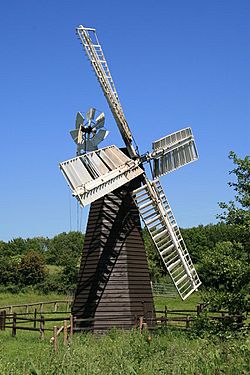Eastbridge Windpump facts for kids
Quick facts for kids Eastbridge Windpump |
|
|---|---|

Eastbridge Windpump as restored at the Museum of East Anglian Life
|
|
| Origin | |
| Mill name | Eastbridge Windpump |
| Mill location | TM 045 580 |
| Coordinates | 52°10′56″N 0°59′32″E / 52.18222°N 0.99222°E |
| Operator(s) | Museum of East Anglian Life |
| Year built | 1979 |
| Information | |
| Purpose | drainage mill |
| Type | Smock mill |
| Smock sides | Eight sides |
| No. of sails | Four Sails |
| Type of sails | Patent sails |
| Windshaft | Cast iron |
| Winding | Fantail |
| Fantail blades | Six blades |
| Type of pump | Three-throw plunger pump |
The Eastbridge Windpump is a special type of windmill called a smock mill. It used to pump water away from land. Today, you can find it at the Museum of East Anglian Life in Stowmarket, Suffolk, England. It has been carefully rebuilt and works again!
The Story of Eastbridge Windpump
The Eastbridge Windpump was likely built in the mid-1800s. A mill builder named Robert Martin from Beccles probably constructed it. Its first job was to help drain the Minsmere Levels near Eastbridge, Leiston. This kept the land from getting too wet.
In the early 1920s, another mill builder, Dan England, made the windpump stronger. He used parts from a nearby smock mill that had fallen down. He bolted these parts over the windpump's outer walls. The windpump worked by wind power until 1940.
After the Second World War, a new iron windpump was put up nearby. This new pump took over the job from the Eastbridge Windpump. On February 19, 1977, the Eastbridge Windpump collapsed.
Members of the Suffolk Mills Group carefully took apart the remains in July 1977. These parts were then used to rebuild the mill at the Museum of East Anglian Life in Stowmarket. The company Jameson Marshall Ltd. did the restoration work.
How the Windpump Works
The Eastbridge Windpump is about 30 feet (9.1 meters) tall. It sits on a brick base. The top part, called the cap, looks like a boat. A fantail helps turn the cap so the sails always face the wind.
The windpump has four Patent sails. These sails are carried on a strong cast-iron shaft called a windshaft. The sails stretch about 44 feet (13.4 meters) wide.
Inside, a cast-iron brake wheel turns another cast-iron gear called a wallower. The wallower is on a vertical shaft. A crown wheel, also made of cast-iron, drives a special pump. This pump is a three-throw plunger pump. It has three cylinders, each about 1 foot (300 millimeters) square, that push water.
Visiting the Windpump
The Eastbridge Windpump is open to the public. You can see it from the outside during the normal opening hours of the Museum of East Anglian Life. It's a great way to see how windmills helped manage water long ago!
 | Stephanie Wilson |
 | Charles Bolden |
 | Ronald McNair |
 | Frederick D. Gregory |

